Free at last.
That is how I felt when I first heard the news that Bill C-150 had passed in the House of Commons after months of horrible, heated debate 40 years ago.
Unfortunately, the feeling did not last very long.
The brainchild of Prime Minister Pierre Trudeau, Bill C-150 overhauled the Criminal Code of Canada to bring it in line with more contemporary views of what should and should not be illegal.
At first, we all thought the bill had decriminalized homosexuality.
However, it soon became clear that Bill C-150 had only decriminalized certain limited actions.
The bill amended the Code’s buggery and gross indecency sections to ensure that sex between two consenting, adult gay men would no longer be a crime — as long as it took place in private and between participants aged 21 years or older.
Based on the British Wolfenden Report of 1957, Trudeau’s bill solved the problem of “sexual deviance” by separating the public and private realms and using criminal law to preserve decency in the public realm, while allowing people to do whatever they want — however immoral — in private.
The bill did not reconsider what constitutes immoral behaviour. It merely pushed gay sex into a narrow private space.
In short, it did not go far enough.
But it was the beginning of something.
***
A MOVEMENT EMERGES. Even a partial decriminalization gave people the confidence to be a bit more open, to join or form gay groups, to be visible. To demand more. ‘A movement became possible,’ says gay historian Don McLeod. Here protesters gather on Parliament Hill in 1971 for the first major gay rights action in Canada. Among their demands: equalize the age of consent for all sex acts, including anal sex. The demonstration marked a significant moment in the emergence of the gay movement in Canada. (Canadian Lesbian and Gay Archives)
Bill C-150 did not legalize homosexuality, agrees gay historian Gary Kinsman.
Of course its passage was “quite significant,” he says. It marked “a real shift away” from the previously blanket prohibition against gay sex.
But there is a “mythology” to Trudeau’s legal reforms, Kinsman says.
As significant as the bill’s passage was in 1969, it only lifted the blanket on specific acts — and then only between adults “behind closed doors.”
The result was not only to corral gay men into a limited space safe from arrest, but to split the gay community down an arbitrary adult/youth divide.
Setting the age of consent for gay sex at 21 left the community’s youth behind, Kinsman says.
The decriminalization was, in fact, “incredibly restrictive,” he argues.
It “contained and restrained” gay male sexuality.
Armed with the bill’s broad definition of “public” — encompassing any sexual act committed in a public place or simply with more than two people present — police promptly stepped up their patrols.
Arrests of gay men increased “quite dramatically” after 1969, Kinsman says, as police cracked down on “gay sex whenever it becomes publicly visible.”
The 1970s saw police raids of bars and bathhouses in Montreal (especially in anticipation of the 1976 Olympics), in Vancouver and of course in Toronto where the gay community rose up and rioted following the infamous 1981 bathhouse raids.
The bathhouse resistance pushed the police back and marked a “massive expansion of the gay and lesbian community in Toronto,” Kinsman says.
As far short as the 1969 amendments had fallen in terms of liberating gay sex, they had carved a small spot for the gay community to meet, to connect and to become more visible, vocal and defiant together.
Bill C-150 created a space for gays and lesbians to move forward — “to expand our communities and our networks,” says Kinsman.
“It was a stepping stone,” agrees gay historian Don McLeod. “It influenced the development of a movement.”
Prior to 1969, gay people were “paranoid” about meeting each other publicly, McLeod explains. Even a partial decriminalization gave people the confidence to be a bit more open, to join or form gay groups, to be visible. To demand more.
THE COURAGE TO COME OUT. Denis LeBlanc still remembers the first gay meeting he ever attended. It was at the University of Waterloo, shortly after the passage of Bill C-150. ‘I went to that meeting and I saw some people that I, in fact, had known the year before, through my classes, and when I left I was so — I was so liberated.’ Here gay people celebrate their newfound liberation, connection and shared visibility at the 1975 National Gay Rights Coalition demonstration in Ottawa. ‘The visibility,’ says gay historian Don McLeod. ‘That’s what it was all about.’ (Canadian Lesbian and Gay Archives)
“A movement became possible,” he says.
For Kinsman, the 1981 bathhouse resistance marked a more significant moment in gay liberation than the passage of Bill C-150.
So did the first gay rights demonstrations a decade earlier.
Held simultaneously in Vancouver and in Ottawa two years after Trudeau’s bill received Royal Assent, participants challenged the bill’s shortcomings and demanded further change.
Among the demands made that day: remove “gross indecency” and “buggery” as grounds for “dangerous sexual offender” status, and equalize the age of consent for all sex acts, including anal sex.
“In 1969, the Criminal Code was amended so as to make certain sexual acts between consenting adults, in private, legal. This was widely misunderstood as ‘legalizing’ homosexuality,” the Aug 28, 1971 Gay Day Committee behind the demonstration wrote at the time.
“In fact, this amendment was merely a recognition of the non-enforceable nature of the Criminal Code as it existed. Consequently, its effects have done but little to alleviate the oppression of homosexual men and women in Canada.
“In our daily lives we are still confronted with discrimination, police harassment, exploitation and pressures to conform which deny our sexuality.”
Ultimately, Trudeau’s reforms helped “create a greater space for the lesbian and gay movement to emerge,” says Kinsman.
“But it also calls for what I often refer to as the empire striking back — to steal a line from a popular culture movie — because once those movements become more visible, the Criminal Code actually calls the police down on these people, tries to restrict them back into the so-called private realm.”
***
Charlie Hill was a student at the University of Toronto when the House of Commons passed Bill C-150. Within a few months of the bill’s passage he helped found the university’s first gay organization.
“I’ve always wondered, you know, what relationship it was to the legislation,” Hill says. “Did it give us a sort of carte blanche to organize an organization without fear?”
VIDEO: Charlie Hill talks about how prejudice remained after Bill C-150’s passage in 1969.
To this day, Hill is not sure what part Bill C-150’s passage played in the group’s formation — “although subconsciously it must have given us a certain amount of freedom to move and to act,” he muses.
“I guess it [the bill] was a catalyst,” he says, “but it really didn’t take away the prejudice or the daily fear that most gays and lesbians lived under at the time.”
If anything, it intensified the threat of arrest for “public” displays of sexuality.
“There was a drive,” Hill says, “a force to make us invisible. If we weren’t going to be invisible, we should be thrown in jail. That’s to put it bluntly.”
Hill recalls being charged with committing an indecent act in the spring of 1967 — before Bill C-150 was introduced — after police raided a bar and found him dancing with another man.
Since the 1969 reforms did not decriminalize expressions of gay sexuality in public, they did nothing to alleviate the threat of arrest for dancing in a bar with another man.
“To say that it [Bill C-150’s passage] affected us in our daily life, I’m not sure it did at that moment,” Hill says.
But it was a “major catalyst for change,” he reiterates.
***
Denis LeBlanc was 18 when the bill passed 40 years ago.
“I’d never spoken the word homosexual to anyone,” he says.
“I was growing up in a small town, Moncton. And, actually, I’d heard about this bill,” says LeBlanc, who would go on to co-found Gays of Ottawa and the Coalition for Lesbian and Gay Rights in Ontario.
“I’d been following it for years. I’d been following it since the Wolfenden Report in Great Britain, and since Great Britain changed its laws.
“I was an altar boy at the time, serving at the Moncton Cathedral, and homosexual acts were, I had always been taught, basically a sin. That’s where I was coming from,” he recalls.
“I was not out. I mean, I was a teenager and I was developing, but I couldn’t talk about it with anybody.”
CATALYST FOR CONNECTION. Prior to Bill C-150’s passage ‘there was no such thing as the gay community, really. There was no such thing as a movement. We weren’t recognized as a minority group. And so this enabled us essentially to fulfill ourselves as a community, as a whole,’ says Denis LeBlanc. Here members of the emerging community gather at the National Gay Rights Coalition demonstration in Ottawa in 1975. (Canadian Lesbian and Gay Archives)
LeBlanc left Moncton when he was 18 to go to university in Waterloo.
“I heard on the radio that there was a general invitation to the student body to show up for the second meeting of the University of Waterloo gay group, and that’s where I came out,” he says.
“Because to me coming out was not really a sexual thing. To me, coming out was meeting other gay people who did not consider that they were sick, who did not consider they were sinners, but rather who considered that they were ordinary individuals trying to live their lives, and trying to find individuals who they could love and express some affection towards. To me, coming out was a social experience.
“And I must say, I went to that meeting and I saw some people that I, in fact, had known the year before, through my classes, and when I left I was so — I was so liberated.
“But you see, it was the Criminal Code change that allowed that to happen.
“Because without that, I think that the explosion that happened in the gay community —through the various university groups and then some community associations in the years that followed — would not have been permitted,” he says.
Of course there was still much work to be done, LeBlanc says.
He remembers writing what he believes to have been Ottawa’s first pamphlet on homophobia in 1973.
“We hired four students. They were brilliant young people, thinkers, with lots of energy, and we said, ‘We’ve been going to schools, teaching things like, you know, homosexuality 101’ — we started outings to schools, health classes, things like that, talking about homosexuality and the whole approach to that was ‘what is the problem of homosexuality?’
VIDEO: Denis LeBlanc talks about how Bill C-150 was a catalyst for an emerging gay community.
“You remember that: the problem of homosexuality, as they used to talk about it, back in the ‘60s? Well, we turned that around. We said, ‘The problem is not homosexuality; the problem is homophobia.’ Isn’t it?
“So we wrote the little pamphlet called Understanding Homophobia — right here, Gays of Ottawa, and we spread it and it became common. Just like blacks had figured out ‘What’s the problem here? It’s not us; racism is the problem.’ We had to figure that out for ourselves.
“And it’s Bill [C-150] that opened the door to us to be able to talk to each other as human beings, to come and make these connections, and take the word gay for ourselves,” says LeBlanc.
Prior to the bill’s passage “there was no such thing as the gay community, really,” LeBlanc maintains. “There was no such thing as a movement. We weren’t recognized as a minority group. And so this enabled us essentially to fulfill ourselves as a community, as a whole.”
***
We’ve come a long way since Trudeau partially decriminalized gay sex 40 years ago.
We have built community, come out in droves, connected with each other, demanded and obtained equal rights. We even won the right to marry.
But we are still not totally free. We are still limited in the expression of our sexuality.
We are still stuck in Bill C-150’s private realm of immorality when it comes to our sexual acts and desires.
PUSHING BACK AGAINST POLICE RAIDS. As groundbreaking as Trudeau’s bill to partially decriminalize gay sex was in 1969, gay historian Gary Kinsman says the Toronto bathhouse resistance marked a more significant moment in gay liberation than the bill’s passage. Here activists John Duggan (left) and George Smith protest the infamous bathhouse raids — marking a ‘massive expansion of the gay and lesbian community in Toronto,’ Kinsman says. (Courtesy of John Duggan)
The whole notion of being relegated to the private sphere still affects us profoundly, Kinsman agrees.
There’s “still a sense that you can’t really show queer sex” in public, he says.
“On the one hand we can win same-sex marriage rights,” he notes. But the gay community still faces so much bigotry towards “the actual practice” of our sexuality.
“Until we deal with that,” he says, we will never really move towards true liberation.
Part of the ongoing bigotry is attributable to the way in which the law reform took place 40 years ago, Kinsman argues.
It happened from the top down, without any of the public discussion that might have led to a shift in attitudes, without the public education that might have led to change.
There was “no real transformation of the popular consciousness,” he says.
“Our society, unfortunately, is still defined by heterosexism and the privileging of heterosexuality as supposedly the only normal and natural sexuality,” he says.
“I mean, just think about the controversies that continue to be generated whenever there’s sort of a public representation of even a hint of lesbian and gay sexuality.
“So we’ve come an awful long way, but we have an awful long way to go still,” says Kinsman.
And we will continue to have an awful long way to go until we have the courage to challenge the deep-seated attitudes that permeate our society around the topics of sex and sin.
Because the limitations of Bill C-150 that were in place 40 years ago, and the limitations that still stall our liberation, all stem from this sense of sin.
The major religions maintain that gay sex — and in fact any sex that does not lead directly to procreation — is a sin.
The purpose of your penis, they say, and the purpose of the women’s equivalent is to procreate.
Anything else would lead to a fantastic amount of social decay, according to the major religions and their most ardent followers.
POLICE CRACKDOWN. Having offered gay men a narrow space in which their sex would no longer be a crime (provided it was behind closed doors with only two men over age 21), police cracked down on any visible expressions of gay sexuality in the public realm. ‘There was a drive,’ says Charlie Hill, ‘a force to make us invisible. If we weren’t going to be invisible, we should be thrown in jail. That’s to put it bluntly.’ Here gay people protest the police force’s pre-Olympic clean-up campaign in Montreal in 1976. (Canadian Lesbian and Gay Archives)
Sex is not about love or about sharing the totality of your self with the person you love.
It is not about desire or attraction.
It’s about procreation, they say.
I say they’re asinine and absurd.
We need to discuss sex in our society.
We need to discuss the essential value of expressing the totality of our bodies, of our attractions and desires.
The only limitation to expressing ourselves physically should be the consent of all parties involved.
We should not have to prove the validity of expressing ourselves sexually any more than we should have to prove the validity of eating or walking.
Sex is the natural fulfillment of attraction.
But the deep-seated attitude that sex is sinful and immoral — the attitude that shaped both the Wolfenden Report and Bill C-150 — has not changed at all in the last 40 years.
So we need to build on Bill C-150. We need to talk about sex, about the naturalness of it, gay and straight.
We need to start the discussion and we need to have the courage to bring it to the schools. Gay kids today are adjusting and coming out more easily but many teachers still think like Queen Victoria and many young people still grow up with the message from parents, teachers and religion that sex is sinful and gay sex is worse.
“The hardest thing I still think is for gay youth,” agrees Hill, “because as a minority, we don’t grow up in our own minority. We grow up in the enemy camp, if you will.
STILL NOT FREE. The deep-seated attitude that sex is sinful and immoral — the attitude that shaped both Bill C-150 and the Wolfenden Report upon which it was based — has not changed at all in the last 40 years, writes Laurier L LaPierre (above), Canada’s first openly gay senator. ‘We need to discuss sex in our society. We need to discuss the essential value of expressing the totality of our bodies, of our attractions and desires.’ (Paul Galipeau photo)
“That’s putting it much too boldly because parents are not necessarily the enemies of gays, but when people as individuals have to come to terms with their own discovery of themselves, the self-affirmation can be very painful if you are isolated or if you have ingested the condemnation of your own identity.”
Though Hill believes things have changed in the last 40 years, gay people are still cast out and targeted, their basic sexuality somehow taken as a threat.
“You know, I’ve walked down the street and had people yell ‘faggot’ at me, even within the last year,” he says.
The people doing the yelling are often young, macho heterosexuals, he notes, who somehow have to define themselves — and to define themselves against a faggot is a way of defining themselves.
“I still think there’s prejudice,” he says. “I don’t think you can ever eradicate prejudice, and I think it’s still there.”
The bottom line, says Kinsman, is that as groundbreaking as Bill C-150 was, it reinforced the idea that gay sex is immoral, and has therefore been central to the very limited way in which our sexuality is tolerated — in private.
To this day, our society struggles with the concept of desire as anything but sinful.
And that has to change.
As long as we continue to operate this way we’re not going to get very far in the true liberation of our sexuality, gay or straight.
Egale Canada will be celebrating the 40th anniversary of Bill C-150 with a fundraising event at Toronto’s King Edward Hotel on Fri, Jun 5. Tickets for the dinner, which features guest speaker MP Justin Trudeau, cost $150. Call 1-888-204-7777 or email rsvp@egale.ca.
Read more:
- Excerpts from the Bill C-150 debates in the House of Commons
- VIDEO: Gay MPs on the legacy of Bill C-150
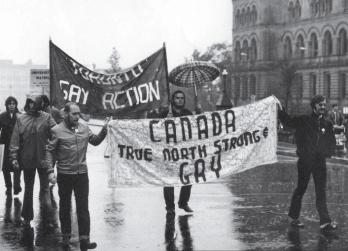
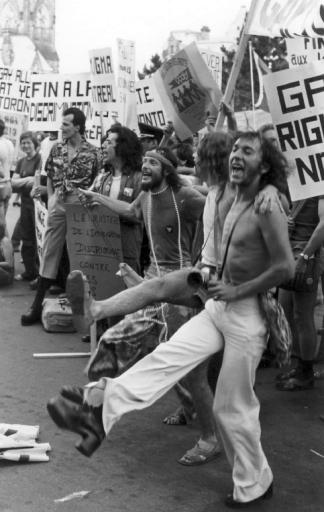
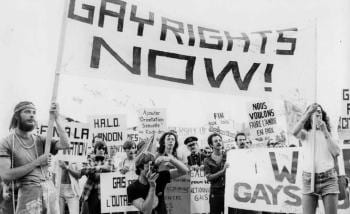
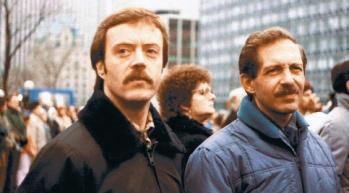
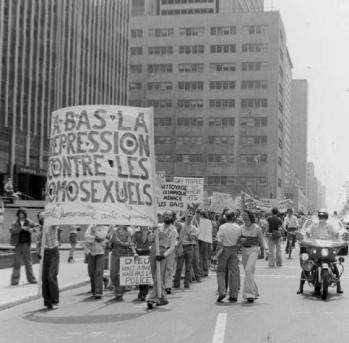
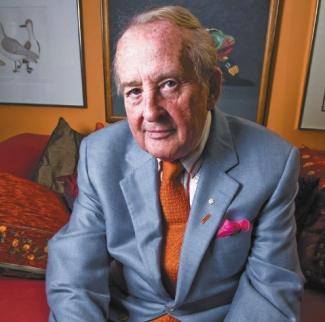
 Why you can trust Xtra
Why you can trust Xtra


